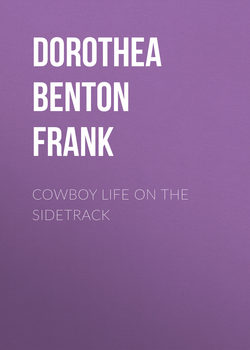Читать книгу Cowboy Life on the Sidetrack - Dorothea Benton Frank - Страница 8
CHAPTER VI.
The Schoolmarm's Saddle Horse
ОглавлениеOne day while waiting on a sidetrack old Chuckwagon got to telling about the new school-marm in their neighborhood. He said he reckoned she was as high educated as anybody ever got. He said she didn't sabe cowpuncher talk much, but she used some mighty high-sounding words. Why, he said, she called a watergap a wateryawn; a shindig, a dawnce; Injuns, Naborigines; cowboys, cow servants, and Bill Allen's hired girl, where she boards, a domestic. The first night she came to Bill Allen's she heard them a talking about cowpunchers, and she asked old Bill if he wouldn't show her a real live cowpuncher: said there weren't any cowpunchers in Boston, where she came from, and old Bill said he'd have one over from the nearest cow ranch next day.
So next morning he comes over to my ranch and tells me to rig out in fur snaps, put on my buckskin shirt and big Mexican hat with tassels on it, with red silk handkerchief around my neck, and he would take me over and introduce me to the new school-marm. So I rigged all up proper, and when we got over to Bill Allen's place, old Bill told his wife to go to the school-marm's room and tell her he had a genuine cowpuncher out there and for her to come out and see him. She told Mrs. Allen she was busy just then, but tell Mr. Allen to take the cowpuncher to the barn and give him some hay and she would be out directly.
Now, he'd been wondering ever since, old Chuck said, what on earth she reckoned a cowpuncher was. Still she was mighty green about some things, 'cause when they had a little party at old Bill Allen's all the girls got to telling about the breed of their saddle hosses, and some said their hoss was a Hamiltonian, and some said their hoss was thoroughbred, and some was Blackhawk Morgan. The school-marm said she had a gentleman friend in Boston who had a very fine saddle hoss of the stallion breed, and when the boys giggled and the gals began to look red, she says as innocent as a lamb. "There is such a breed of hosses, ain't they?" "Of course," she says, "I know it's a rare breed and perhaps you folks out here never saw any of that breed." She says, "They are great hosses to whinney. Why, my friend's hoss kept whinneying all the time." When she got to describing that hoss's habits, course all us boys begun to back up and git out the room. I reckon she was from an Irish family, 'cause she insisted Mrs. Flanagan was right when she called the station a daypo.
But I reckon she could just knock the hind sights off anybody when it came to singing. I never did know just whether it was a song or not she sung, 'cause none of us could understand it. She said it was Italian, and of course there wasn't any of us understood any Dago talk. But she would just commence away down in a kind of low growl, like a sleeping foxhound when he is dreaming of a bear fight, and keep growling a little louder and little louder, and directly begin to give some short barks, and then it would sound like a herd of wild cattle bawling round a dead carcass; then like a lot of hungry coyotes howling of a clear frosty night, and finally wind up like hundreds of wild geese flying high and going south for winter. She said her voice had been cultivated and I reckon it had. You could tell it had been laid off in mighty even rows, the weeds all pulled out and the dirt throwed up close to the hills. But somehow I'd a heap rather hear a little blue-eyed girl I know up in the mountains in Idaho sing "The Suwanee River," and "Coming Through the Rye," 'cause I can understand that. But I guess them Boston girls are all right at home. I reckon they are used to them there.
